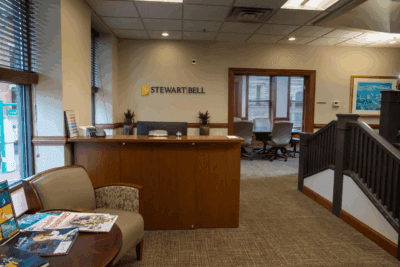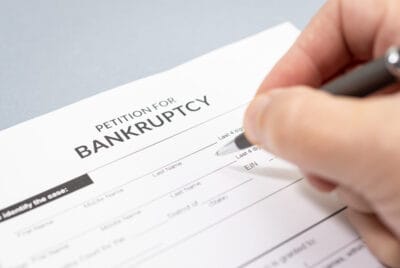
The Short Answer…
Bankruptcy is a legal process that helps people or businesses who cannot repay their debts get financial relief through the federal court system. It gives debtors a chance at a fresh start by either eliminating certain debts or creating a manageable repayment plan, while also ensuring creditors receive some repayment.
Bankruptcy is not the end of your financial future—it is a structured way to regain control when debt becomes overwhelming. At Stewart Bell, PLLC, our West Virginia bankruptcy lawyers provide the experience, local knowledge, and compassionate guidance you need to navigate this process with confidence. We work with you to protect your assets, stop creditor harassment, and put you on the path toward lasting financial stability.
Key Takeaways
- Bankruptcy provides a legal fresh start by either discharging unsecured debts like credit cards and medical bills or restructuring them into a manageable repayment plan.
- The automatic stay offers immediate relief, stopping lawsuits, wage garnishments, foreclosure, repossession, and collection calls the moment you file.
- Chapter 7 bankruptcy is fast debt relief through liquidation, while Chapter 13 bankruptcy protects assets with a structured 3–5 year repayment plan.
- An experienced bankruptcy lawyer can help protect your assets, guide you through exemptions, and help you achieve the strongest outcome possible.
Table of Contents
- Bankruptcy Basics
- Types of Bankruptcy
- Chapter 7 Bankruptcy: Liquidation
- Chapter 13 Bankruptcy: Reorganization
- What’s the Difference Between Chapter 7 and Chapter 13 Bankruptcy?
- Other Types of Bankruptcy
- What Happens When You File for Bankruptcy?
- Why File for Bankruptcy?
- Do You Need a Lawyer to File Bankruptcy?
- The Benefits of Working With an Attorney
- Why West Virginians Trust Stewart Bell, PLLC for Bankruptcy Relief
- Bankruptcy FAQs
- Bankruptcy Help for a Stronger Financial Future–No Upfront Costs
Bankruptcy Basics
Bankruptcy is a court-supervised process that helps people and businesses overwhelmed by debt find financial relief. At its core, bankruptcy is designed to give debtors a financial “reset” while also protecting the rights of creditors.
When you file for bankruptcy, you are essentially asking the court to evaluate your financial situation and either:
- Erase (discharge) certain debts entirely so you are no longer legally obligated to pay them, or
- Restructure your debts into a more manageable payment plan over a set period of time.
Key Features of Bankruptcy
- Federal Process: Bankruptcy cases are always handled in U.S. Bankruptcy Court, not state court. This ensures a standardized process across the country.
- Involvement of a Trustee: A neutral third party, called a bankruptcy trustee, is appointed to oversee your case. The trustee’s role is to manage assets, ensure fairness, and distribute payments to creditors if applicable.
- Immediate Protection Through the Automatic Stay: Filing initiates an automatic stay, a court order that immediately stops most collection activities, including foreclosure, repossession, and wage garnishment. This protection gives you breathing room to work through the case.
- Consequences and Fresh Start: While bankruptcy impacts your credit for years, it also provides a light at the end of the tunnel, the chance to eliminate overwhelming debt, and the opportunity to begin rebuilding financial stability. For many, this fresh start is more valuable than struggling with unmanageable payments, and the harm to your credit is comparable to simply not paying your debts.
Bankruptcy is a safety net built into U.S. law to help people when debt becomes insurmountable due to job loss, medical bills, divorce, or other financial crises. It exists to provide honest debtors with a second chance.
Types of Bankruptcy
When people think of bankruptcy, they are usually referring to Chapter 7 or Chapter 13. Each provides a different pathway to financial recovery depending on income, assets, and long-term goals. Understanding the difference between them is critical before deciding which chapter may fit your situation best.
Chapter 7 Bankruptcy: Liquidation
Chapter 7 is often called liquidation bankruptcy. It is designed for people who do not have enough income to pay back their debts. To repay creditors, the court may require the sale of certain non-exempt assets.
- Eligibility: To qualify, you must pass a means test showing that your income is below a certain threshold compared to your state’s median.
- Asset Protection: Most people who file Chapter 7 keep essential property because bankruptcy exemptions protect things like clothing, basic household goods, retirement accounts, and even some equity in a home or vehicle.
- Process Timeline: A typical Chapter 7 case lasts 3 to 6 months, making it one of the fastest forms of debt relief available.
- Outcome: At the end, most unsecured debts—such as credit cards, personal loans, and medical bills—are completely discharged.
Chapter 13 Bankruptcy: Reorganization
Chapter 13 is often referred to as a wage earner’s plan or reorganization bankruptcy. Unlike Chapter 7, it does not require the liquidation of assets. Instead, it is designed for people who have a steady income but need time and structure to repay debts.
- Repayment Plan: Debtors work with the court and trustee to create a 3 to 5-year repayment plan. Monthly payments are made to the trustee, who then distributes the funds to creditors.
- Asset Protection: Chapter 13 allows you to keep your property, even if you have fallen behind on your mortgage, car loan, or other secured debts. It’s often used by individuals who want to stop foreclosure or repossession.
- Debt Limits: There are certain debt limits to qualify, and your repayment ability is based on disposable income after necessary living expenses.
- Outcome: Once the repayment plan is completed, remaining eligible debts may be discharged, giving you a clean slate moving forward.
What’s the Difference Between Chapter 7 and Chapter 13 Bankruptcy?
| Chapter 7 | Chapter 13 | |
|---|---|---|
| Who It’s For | People with limited income and high unsecured debt | People with steady income who want to catch up on payments |
| Eligibility | Must pass a means test showing low enough income | Must have regular income; subject to certain debt limits |
| Process Length | Usually 4–6 months | Usually 3–5 years |
| Treatment of Assets | Non-exempt assets may be sold by trustee; most essentials protected by exemptions | You keep your property if you stick to the repayment plan |
| Debt Relief | Most unsecured debts (credit cards, medical bills, personal loans) discharged | Debts reorganized; remaining eligible debts discharged at end of repayment plan |
| Credit Report Impact | Remains for up to 10 years | Remains for up to 7 years |
Other Types of Bankruptcy
While individuals usually file Chapter 7 or 13, other chapters exist:
- Chapter 9: Municipalities.
- Chapter 11: Business reorganization.
- Chapter 12: Relief for family farmers and fishermen.
- Chapter 15: Cross-border bankruptcy cases.
Choosing the right option depends on your income, the type of debts you carry, and your long-term financial goals. A bankruptcy lawyer can help you evaluate your situation and guide you toward the path that provides the best chance for a fresh start.
What Happens When You File for Bankruptcy?
Bankruptcy works by placing your financial situation under the supervision of a federal bankruptcy court. The process is designed to protect you from aggressive debt collection while ensuring creditors receive as much repayment as possible under the law.
Here’s how it typically works:
- The case begins when you file a petition in federal bankruptcy court. This petition includes detailed financial information, such as your income, assets, debts, expenses, and recent financial transactions.
- At this point, you must also complete mandatory credit counseling through an approved agency before the court accepts your case.
- Immediately after filing, the court issues an automatic stay. This powerful legal protection stops most creditor actions, including foreclosure proceedings, repossession, lawsuits, wage garnishments, and collection calls.
- The stay gives you breathing room to work with the trustee and court without pressure from creditors.
- A bankruptcy trustee is appointed to manage your case. The trustee reviews your financial documents, verifies your eligibility, and ensures creditors are treated fairly.
- In Chapter 7 cases, the trustee may sell non-exempt property to repay creditors.
- In Chapter 13 cases, the trustee oversees your repayment plan and distributes payments to creditors.
- You are required to attend a short hearing where the trustee and creditors can ask questions about your finances.
- Chapter 7: The trustee liquidates (sells) non-exempt assets, and the proceeds go to creditors. However, most people who would normally have to have assets sold instead choose to file a Ch. 13.
- Chapter 13: You make regular payments, usually for 3 to 5 years, under a court-approved repayment plan. This allows you to keep your property while catching up on debts like a mortgage or car loan.
- At the end of the process, eligible debts are discharged, meaning you are no longer legally required to pay them. This is the “fresh start” most debtors seek.
- Not all debts can be discharged (such as child support, alimony, and most student loans and most tax debt).
- Once your case is closed, you begin rebuilding your financial life. While bankruptcy impacts your credit report, many people find it easier to rebuild after eliminating crushing debt than continuing to struggle under it.
Why File for Bankruptcy?
Filing for bankruptcy is never an easy decision, but for most people, it is the most practical and effective way to break free from overwhelming debt. Bankruptcy exists to provide a structured, court-supervised solution when traditional repayment options are no longer possible. By taking this step, debtors can stop the cycle of stress, collection efforts, and financial uncertainty and instead work toward a new beginning.
Benefits of Filing for Bankruptcy
Bankruptcy offers a wide range of protections and opportunities, including:
- Immediate Relief From Collection Pressure: The moment you file, the automatic stay goes into effect to stop creditor harassment, lawsuits, wage garnishments, and even foreclosure proceedings.
- Elimination of Unsecured Debts: Credit card balances, medical bills, personal loans, payday loans, and other unsecured debts can often be discharged. This allows you to clear away the bulk of what’s weighing you down and focus on rebuilding.
- Protection of Essential Assets: Bankruptcy exemptions allow you to keep many essentials, such as a portion of your home equity, your primary vehicle, retirement savings, and household goods. In Chapter 13, you can even catch up on overdue mortgage or car payments and prevent repossession.
- A True Fresh Start: While bankruptcy does impact your credit in the short term, it also clears away unmanageable debt, allowing you to rebuild your finances with less stress and greater stability.
Consequences of Bankruptcy
While bankruptcy offers powerful relief, it also comes with consequences that you should understand before filing:
- Credit Report Impact: A bankruptcy filing will appear on your credit report (Chapter 7 for up to 10 years and Chapter 13 for up to 7 years). However, many people find their credit scores begin improving much sooner once old debts are cleared and on-time payments resume.
- Loss of Certain Assets: In Chapter 7, non-exempt assets such as luxury items or non-essential property may be sold to repay creditors. The good news is that exemptions protect the vast majority of assets for those who qualify for Chapter 7, and most people keep the property that matters most, such as their home, vehicles, and retirement and education savings.
- Not All Debts Are Erased: Bankruptcy does not wipe out every type of debt. Obligations like most student loans, child support, alimony, and recent tax debts remain after the process.
- Borrowing After Bankruptcy: Getting new credit, a mortgage, or a loan can be more difficult right after filing. Still, many people are surprised at how quickly opportunities return once their debt is under control. With responsible financial habits, bankruptcy can actually set the stage for faster recovery.
Instead of continuing to struggle with debts that never seem to shrink, bankruptcy allows you to reset your financial life under the protection of the law. With the right guidance, many people emerge from bankruptcy with hope, stability, and a stronger foundation for the future.
Do You Need a Lawyer to File Bankruptcy?
Technically, you are allowed to file bankruptcy without a lawyer. However, bankruptcy law is highly complex, and even a small mistake in your paperwork or filing process can cost you time, money, or even result in your case being dismissed. Working with a qualified bankruptcy attorney ensures you get the full protection of the law and make the most of the financial reset bankruptcy provides.
The Benefits of Working With an Attorney
- Maximizing Your Exemptions: Bankruptcy exemptions determine what property you are allowed to keep. An attorney knows how to apply federal and state exemption laws to protect as much of your home, vehicle, retirement accounts, education savings accounts, and personal property as possible.
- Avoiding Costly Errors: Bankruptcy involves extensive paperwork, strict deadlines, and mandatory disclosures. A single oversight could result in your case being dismissed (with no refund) or cause debts to remain that otherwise could have been discharged. An attorney helps ensure everything is filed correctly the first time.
- Choosing the Best Path: Many people are unsure about their eligibility and options. A lawyer can review your income, debts, and goals to recommend the filing type that gives you the best possible outcome.
- Protecting You From Creditors: Even though the automatic stay stops collection actions, creditors sometimes push back. Your attorney stands between you and creditors, making sure your rights are fully protected throughout the process.
- Guidance From Start to Finish: From pre-filing credit counseling to your discharge or repayment plan completion, an attorney provides clarity and peace of mind. You’ll always know what to expect and how to prepare for each step.
Why West Virginians Trust Stewart Bell, PLLC for Bankruptcy Relief
Choosing the right attorney can make all the difference in how smoothly your bankruptcy case goes and in the results you achieve. At Stewart Bell, PLLC, we’re trusted advocates who understand the challenges West Virginians face and are committed to helping you find lasting financial relief.
Here’s what sets our firm apart:
- Decades of Experience: Our attorneys have successfully handled bankruptcy cases, giving us the knowledge to anticipate challenges and find the best solutions.
- Local Representation: As a West Virginia-based firm, we understand the unique state and federal laws that affect your case and can apply them to your advantage.
- Personalized Guidance: We take the time to explain your options clearly, ensuring you feel confident and informed every step of the way.
- Asset Protection Strategies: Our team works hard to help maximize exemptions and safeguard the property and income that matter most to you.
- Compassionate Support: We know bankruptcy is stressful. Our team provides reassurance, respect, and steady guidance from start to finish.
- Free Case Reviews: We offer no-cost, no-obligation consultations so you can explore your options without financial pressure.
With Stewart Bell, PLLC, you won’t face bankruptcy alone. You’ll have a dedicated team on your side, fighting to protect your financial future.
Bankruptcy FAQs
A bankruptcy discharge is a court order that releases you from personal liability for certain debts. Once granted, creditors can no longer attempt to collect on those debts. This is often considered the ultimate “fresh start” in bankruptcy.
A bankruptcy exemption is a legal protection that allows you to keep certain property when you file. Common exemptions include a portion of your home equity, your primary vehicle, retirement savings, and household goods. Exemptions vary by state and can significantly affect what property you keep.
An automatic stay is an immediate court order that takes effect when you file for bankruptcy. It stops most collection efforts, including lawsuits, wage garnishments, foreclosures, repossessions, and creditor phone calls.
A Chapter 7 bankruptcy stays on your credit report for up to 10 years, while a Chapter 13 remains for up to 7 years. However, many people begin rebuilding their credit much sooner once debts are discharged or restructured.
No. Debt consolidation combines multiple debts into a single payment, often through a loan or repayment program. Bankruptcy is a legal process that can eliminate certain debts entirely and provides protections like the automatic stay.
Bankruptcy Help for a Stronger Financial Future–No Upfront Costs
If you’re overwhelmed by debt, bankruptcy is a legal tool designed to help you reset, protect your most important assets, and build a stronger foundation for the future. At Stewart Bell, PLLC, we’ve helped countless West Virginians navigate Chapter 7 and Chapter 13 bankruptcy with compassion and proven results.
The first step toward relief is simple: schedule a free case review with our team. We’ll walk you through your options, explain how bankruptcy works for your unique situation, and help you move forward with confidence.





